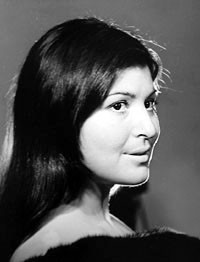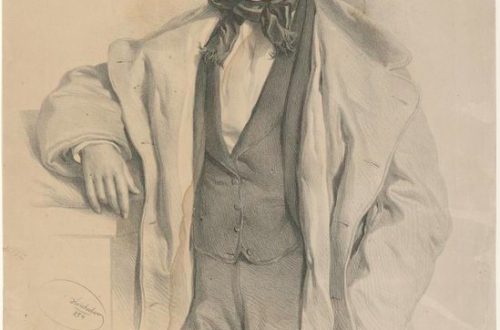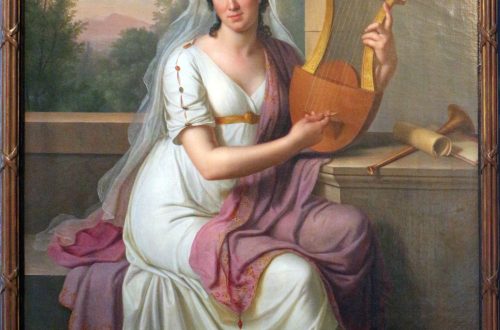
Leonid Vitalievich Sobinov |
Leonid Sobinov

The largest Soviet musicologist Boris Vladimirovich Asafiev called Sobinov “the spring of Russian vocal lyrics.” His worthy heir Sergei Yakovlevich Lemeshev wrote: “The significance of Sobinov for the Russian theater is unusually great. He made a real revolution in the art of opera. Loyalty to the realistic principles of the theater was combined in him with a deeply individual approach to each role, with tireless, truly research work. Preparing the role, he studied a huge amount of material – the era, its history, politics, its way of life. He always strove to create a natural and truthful character, to convey the complex psychology of the hero. “Slightly the spiritual world clears up,” he wrote about his work on the role, “you involuntarily pronounce the phrase differently.” If the basses, with the advent of Chaliapin on the stage, realized that they could not sing the way they sang before, then the lyrical tenors understood the same with the advent of Sobinov.
Leonid Vitalyevich Sobinov was born in Yaroslavl on June 7, 1872. Grandfather and father of Leonid served with the merchant Poletaev, they transported flour around the province, and the gentlemen were paid dues. The environment in which Sobinov lived and grew up did not favor the development of his voice. The father was stern in character and far from any kind of art, but the mother sang folk songs well and taught her son to sing.
Lenya spent his childhood and youth in Yaroslavl, where he graduated from high school. Sobinov himself later said in one of his letters:
“The last year, when I graduated from the gymnasium, in 1889/90, I got a tenor, with which I began to sing along in the theological gymnasium choir.
Finished high school. I am at the university. Here again I was instinctively drawn to circles where they sang … I met such a company, I was on duty at night for tickets at the theater.
… My Ukrainian friends went to the choir and pulled me. Backstage was always a sacred place for me, and therefore I completely devoted myself to a new occupation. The university has faded into the background. Of course, my stay in the choir had no great musical significance, but my love for the stage was clearly expressed. Along the way, I also sang in the spiritual student choir, which this year was founded at the university, and in the secular one. I then participated in both choirs all four years while I was at the university … the idea that I should learn to sing came to my mind more and more importunately, but there were no funds, and more than once I passed along Nikitskaya, on the way to the university , past the Philharmonic School with a secret thought, but if not to go in and ask to be taught. Fate smiled at me. In one of the student concerts P.A. Shostakovsky met several students, including me, asked us to take part in the choir of the school, where Mascagni’s Rural Honor was then staged for the exam … At parting, Shostakovsky suggested that I study seriously next year, and indeed, in 1892/93 year I was accepted as a free student in Dodonov’s class. I set to work very zealously and attended all the required courses. In the spring there was the first exam, and I was transferred immediately to the 3rd year, putting 4 1/2 for some classical aria. In 1893/94, the Philharmonic Society, among some of its directors, founded an Italian opera … The society had in mind to create for the students of the school something like school-stages, and the students performed insignificant parts there. I was also among the performers … I sang all the small parts, but in the middle of the season I was already entrusted with Harlequin in Pagliacci. So another year passed. I was already in my 4th year at the university.
The season was over, and I had to start preparing for the state exams with tripled energy. Singing was forgotten… In 1894 I graduated from the university. Further military service was coming … Military service ended in 1895. I am already a second lieutenant in the reserve, accepted into the Moscow bar, wholly devoted to a new, interesting case, to which, it seemed, the soul lay, always striving for the public, for justice and protection of the offended.
The singing faded into the background. It has become more of an entertainment … at the Philharmonic, I attended only singing lessons and opera classes …
The year 1896 ended with a public examination in which I sang an act from The Mermaid and an act from Martha on the stage of the Maly Theatre. Along with this, there were endless charity concerts, trips to cities, two participation in student concerts, where I met artists from state theaters, who seriously asked me if I was thinking of going on stage. All these conversations greatly embarrassed my soul, but the main seducer was Santagano-Gorchakova. The next year, which I spent in the same way as the previous one, I was already in singing at the last, 5th course. At the exam, I sang the last act from The Favorite and the act from Romeo. The conductor B.T. Altani, who suggested that Gorchakova bring me to the Bolshoi Theater for an audition. Gorchakova managed to get my word of honor that I would go. Nevertheless, on the first day of the trial, I did not risk it, and only when Gorchakova shamed me did I appear on the second day. The test was successful. Gave a second – again successful. They immediately offered a debut, and in April 1897 I made my debut at the Synodal in the opera The Demon … “
The success of the young singer exceeded all expectations. After the end of the opera, the audience applauded enthusiastically for a long time, and the aria “Turning into a Falcon” even had to be repeated. The famous Moscow music critic S.N. Kruglikov responded to this performance with a benevolent review: “The singer’s voice, so popular in concert halls … not only turned out to be suitable for the huge hall of the Bolshoi Theater, but made an even more favorable impression there. This is what it means to have metal in the timbre: this property of sound often successfully replaces its true strength.
Sobinov quickly conquered the entire artistic world. His captivating voice was combined with an endearing stage presence. Equally triumphant were his performances at home and abroad.
After several seasons at the Bolshoi Theater, Sobinov goes on tour to Italy to the world-famous La Scala theater in Milan. He sang in two operas – “Don Pasquale” by Donizetti and “Fra Diavolo” by Auber. Despite the different nature of the parties, Sobinov did an excellent job with them.
“Tenor Sobinov,” wrote one reviewer, “is a revelation. His voice is just golden, full of metal and at the same time soft, caressing, rich in colors, enchanting with tenderness. This is a singer suited to the genre of the music he performs…according to the purest traditions of operatic art, traditions so little characteristic of modern artists.”
Another Italian newspaper wrote: “He sang with grace, tenderness, ease, which already from the first scene won him the general favor of the public. He has a voice of the purest timbre, even, deeply sinking into the soul, a rare and precious voice, which he manages with rare art, intelligence and taste.
Having also performed in Monte Carlo and Berlin, Sobinov returns to Moscow, where he plays the role of de Grieux for the first time. And Russian criticism enthusiastically accepts this new image created by him.
The famous artist Munt, a fellow student of the singer, wrote:
“Dear Lenya, you know that I never praised you in vain; on the contrary, she has always been more restrained than necessary; but now it doesn’t even half express the impression you made on me yesterday… Yes, you convey the suffering of love amazingly, dear singer of love, true brother of Pushkin’s Lensky!…
I say all this not even as your friend, but as an artist, and I judge you from the strictest point of view, not of opera, not of drama, but of broad art. I am so glad that I happened to see that you are not only an exceptionally musical, great singer, but also a very talented dramatic actor … “
And already in 1907, the critic N.D. Kashkin notes: “A decade of a stage career has not passed in vain for Sobinov, and he is now a mature master in his art, it seems that he has completely broken with all sorts of routine techniques and treats his parts and roles as a thinking and talented artist.”
Confirming the words of the critic, at the beginning of 1908 Sobinov achieved great success on tour in Spain. After the performance of arias in the operas “Manon”, “Pearl Seekers” and “Mephistopheles”, not only the audience, but also the stage workers give him a standing ovation after the performances.
Famous singer E.K. Katulskaya recalls:
“Leonid Vitalyevich Sobinov, being my partner on the opera stage for many years, had a huge influence on the development of my work … Our first meeting was on the stage of the Mariinsky Theater in 1911 – in the second season of my work in the theater.
A new production of the opera Orpheus, a masterpiece of Gluck’s musical and dramatic genius, was being prepared, with L.V. Sobinov in the title part. For the first time on the Russian opera stage, the part of Orpheus was entrusted to a tenor. Previously, this part was performed by contralto or mezzo-soprano. I performed the part of Cupid in this opera…
On December 21, 1911, the premiere of the opera Orpheus took place at the Mariinsky Theater in an interesting production by Meyerhold and Fokine. Sobinov created a unique – inspired and poetic – image of Orpheus. His voice still resounds in my memory. Sobinov knew how to give recitative a special melodiousness and aesthetic charm. Unforgettable is the feeling of deep sorrow expressed by Sobinov in the famous aria “I lost Eurydice” …
It is difficult for me to recall a performance in which, just like in Orpheus at the Mariinsky Stage, different types of art would be organically merged: music, drama, painting, sculpture and Sobinov’s wonderful singing. I would like to quote just one excerpt from the many reviews of the capital’s press on the play “Orpheus”: “Mr. Sobinov performed in the title role, creating a charming image in terms of sculpture and beauty in the role of Orpheus. With his heartfelt, expressive singing and artistic nuances, Mr. Sobinov delivered complete aesthetic pleasure. His velvety tenor sounded excellent this time. Sobinov can safely say: “Orpheus is me!”
After 1915, the singer did not conclude a new contract with the imperial theaters, but performed at the St. Petersburg People’s House and in Moscow at the S.I. Zimin. After the February Revolution, Leonid Vitalievich returns to the Bolshoi Theater and becomes its artistic director. On March XNUMX, at the grand opening of the performances, Sobinov, addressing the audience from the stage, said: “Today is the happiest day in my life. I speak in my own name and in the name of all my theater comrades, as a representative of truly free art. Down with the chains, down with the oppressors! If earlier art, despite the chains, served freedom, inspiring fighters, then from now on, I believe, art and freedom will merge into one.
After the October Revolution, the singer gave a negative answer to all proposals to emigrate abroad. He was appointed manager, and somewhat later commissioner of the Bolshoi Theater in Moscow. But Sobinova is drawn to singing. He performs all over the country: Sverdlovsk, Perm, Kyiv, Kharkov, Tbilisi, Baku, Tashkent, Yaroslavl. He also travels abroad – to Paris, Berlin, the cities of Poland, the Baltic states. Despite the fact that the artist was approaching his sixtieth birthday, he again achieves tremendous success.
“The entire former Sobinov passed in front of the audience of the crowded hall of Gaveau,” wrote one of the Paris reports. – Sobinov opera arias, Sobinov romances by Tchaikovsky, Sobinov Italian songs – everything was covered with noisy applause … It is not worth spreading about his art: everyone knows it. Everyone who has ever heard him remembers his voice… His diction is as clear as a crystal, “it’s like pearls are pouring onto a silver platter.” They listened to him with emotion … the singer was generous, but the audience was insatiable: she fell silent only when the lights went out.
After his return to his homeland, at the request of K.S. Stanislavsky becomes his assistant in the management of the new musical theater.
In 1934, the singer travels abroad to improve his health. Already ending his trip to Europe, Sobinov stopped in Riga, where he died on the night of October 13-14.
“Possessing the magnificent qualities of a singer, musician and dramatic actor and rare stage charm, as well as a special, elusive, “Sobinov’s” grace, Leonid Vitalyevich Sobinov created a gallery of images that were masterpieces of opera performance, writes E.K. Katulskaya. – His poetic Lensky (“Eugene Onegin”) became a classic image for subsequent performers of this part; his fairy-tale tsar Berendey (“The Snow Maiden”), Bayan (“Ruslan and Lyudmila”), Vladimir Igorevich (“Prince Igor”), enthusiastic graceful cavalier de Grieux (“Manon”), fiery Levko (“May Night”), vivid images – Vladimir (“Dubrovsky”), Faust (“Faust”), Sinodal (“Demon”), Duke (“Rigoletto”), Yontek (“Pebble”), Prince (“Mermaid”), Gerald (“Lakme”), Alfreda (La Traviata), Romeo (Romeo and Juliet), Rudolph (La Boheme), Nadir (The Pearl Seekers) are perfect examples in the art of opera.”
Sobinov was generally an extremely gifted person, an excellent conversationalist and very generous and sympathetic. Writer Korney Chukovsky recalls:
“His generosity was legendary. He once sent a piano as a gift to the Kyiv School for the Blind, just as others send flowers or a box of chocolates. With his concerts, he gave 45 gold rubles to the Mutual Aid Fund of Moscow Students. He handed out cheerfully, cordially, affably, and this was in harmony with his entire creative personality: he would not have been a great artist who brought so much happiness to any of us if he did not have such a generous benevolence towards people. Here one could feel that overflowing love of life with which all his work was saturated.
The style of his art was so noble because he himself was noble. By no tricks of artistic technique he could have developed in himself such a charmingly sincere voice if he himself did not have this sincerity. They believed in the Lensky created by him, because he himself was like that: careless, loving, simple-hearted, trusting. That’s why as soon as he appeared on stage and uttered the first musical phrase, the audience immediately fell in love with him – not only in his game, in his voice, but in himself.





